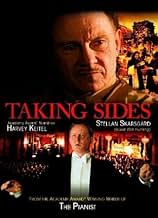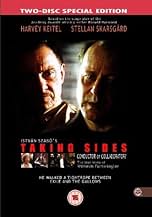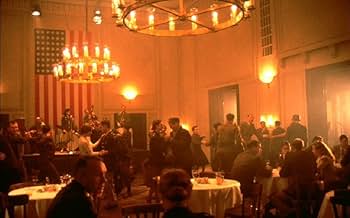Ajouter une intrigue dans votre langueAfter the end of World War II, a famous German conductor is accused of loyalty to the Nazi regime. He argues that art and politics are separate. An investigator thinks otherwise.After the end of World War II, a famous German conductor is accused of loyalty to the Nazi regime. He argues that art and politics are separate. An investigator thinks otherwise.After the end of World War II, a famous German conductor is accused of loyalty to the Nazi regime. He argues that art and politics are separate. An investigator thinks otherwise.
- Prix
- 9 victoires et 3 nominations au total
Avis en vedette
But, as another person here has said, one of the great things about this movie is that it will start arguments.
The Major pursues Furtwangler like a rabid dog, determined to show that that Furtwangler was guilty of something.Why didn't Furtwangler leave when he had the chance? Did he seek out accolades from the devil?
Why is Major Arnold so Angry? It it the anger of a small man who feels spat upon by life, suddenly given the chance of bring down someone once so High and Mighty?
FurtWangler is aloof, distant, full of easy platitudes about the redemptive quality of Art. Major Arnold is mean and streetwise, quick to attack and condemn those who he does not understand.
Who is in the wrong? In the end does it mean anything to believe you are right? In whose eyes anyway? This film asks some difficult questions about how we perceive ourselves and others, how we question our most basic motives. Very Good.
The film is the story of the investigation by the American post-war authorities to decide whether the accusations of collaboration are valid. The film presents two ethical answers. The first one is stated by the American officer (played excellently by Harvey Keitel), who believes that Furtwängler is morally guilty, as he accepted a shining career from the Nazi's hand. The second answer is presented by Furtwängler himself who tries to defend himself by stating that in order to help (by "help" he both meant practical assistance - as he did save many Jews during the war - and a spiritual message - as he claimed that his music maintained the inner good in his nation's soul even in the time of Evil) he had to compromise with the Nazis, but he never really collaborated with them. The film itself (despite its title) does not take side, although it seems to sympathize with Furtwängler as an artist and generally presents the American officer as an ignorant and illiterate person. However, as the investigation proceeds, this aggressive and obnoxious person asks questions that are very hard to answer: is it acceptable to make such a compromise with a regime that kills 6 million Jews? Is it really so that Furtwängler made the compromise with the idea of helping people in need? Or rather, did he make it to advance his career?
The film has triggered exciting conversations with my friends who have differing opinions. I think these lengthy talks are the best proof that this is an excellent film and it has achieved its aim.
The story has several layers (I particularly liked the way differences of American and German cultures are presented), the characters are exciting and well played: if you like thought-provoking movies, go for this one!
For example: there are frequent references in the dialogue to Furtwängler's rival, Herbert von Karajan ("Little K.") Why did the Americans attack Furtwängler, and not von Karajan, who was an ardent Nazi? Furtwängler was prevented from conducting in the U.S., while von Karajan was lionized. Perhaps the makers of this film thought that the implications of this were too big to be discussed in the film. I'm sure that they didn't even want to go near the fact that the people who ran the de-nazification program were Americans with close ties to the Nazis themselves.
Also, Furtwängler's rationale for staying in Germany was somewhat more philosophical than the film implies. He thought he was defending the legacy of Mozart, Beethoven et al against the Nazis, and that this was a sacred responsibility. A bit of this comes out in the film, but in a superficial way.
With respect to the success of the film otherwise, Stellan Skarsgaard is excellent as Furtwängler, even managing to resemble him somewhat. I think that Harvey Keitel is somewhat hampered by the script -- the film would have been more successful if Keitel had come off as more conflicted and less one-dimensional. Clearly the director wished to imply that Keitel was conflicted, but that, as a military man, he was required to toe the line -- the frequent shots of Army indoctrination films (about how bad the Germans were) were intended to provide a rationale for Keitel's behavior. But the film would have been more compelling if Keitel were given an opportunity to express more doubts about what he was being asked to do. I also thought that the ending was a bit anticlimactic.
What I'd like to note is that this is a film of a dying breed. It is truly educational and stimulates our systematically dumbed down intellect ( as also Szabo's older film "Mephisto" ). It's when reading the comments of other viewers that one realizes that there are still people out there that can appreciate film as a vehicle of dialectic and whose insightful observations add to our collective learning experience. Thank you.. it is SUCH a pleasure to read your comments.
dvoulio
Le saviez-vous
- AnecdotesTo the criticism of both movie critics and American audiences of depicting the American Denazification officer Maj. Steve Arnolds (Harvey Keitel) as a "caricature, a bully, a Philistine," screenplay writer Ronald Harwood told The Jewish Journal that he went on to comb archives for denazification transcripts and to interview officials who had supervised such proceedings."They were morally brutal," Hardwood stated. "They bullied people, and they did behave in an extreme way. But they had just seen the camps, and no one in the world had seen that before."
- GaffesWhen Major Arnold is listening to the recording of Beethoven's Fifth Symphony, the record finishes the first movement and carries straight on to the second. Long playing albums, which ran at 33 1/3 rpm, were introduced in 1948, but the record shown is a 78 rpm one. The performance of the 5th Symphony would have been on a set of five 78 rpm records, one movement each, split over the two sides. It should not be possible for the second movement to start without the record being changed.
- Citations
Emmi Straube: When he made his decision, he couldn't have known everything. Especially not the way people like you do, who've returned from exile and feel that you have a right to pass judgement. Because you are blameless, you think you know best who is a sinner and who deserves forgiveness. But you have no idea how people lived here.
- ConnexionsEdited into Taking Sides Again (2004)
Meilleurs choix
- How long is Taking Sides?Propulsé par Alexa
Détails
- Date de sortie
- Pays d’origine
- Langues
- Aussi connu sous le nom de
- Taking Sides
- Lieux de tournage
- sociétés de production
- Consultez plus de crédits d'entreprise sur IMDbPro
Box-office
- Budget
- 20 000 000 $ US (estimation)
- Brut – États-Unis et Canada
- 188 952 $ US
- Fin de semaine d'ouverture – États-Unis et Canada
- 22 051 $ US
- 7 sept. 2003
- Brut – à l'échelle mondiale
- 422 832 $ US
- Durée
- 1h 48m(108 min)
- Couleur
- Mixage
- Rapport de forme
- 1.85 : 1


































